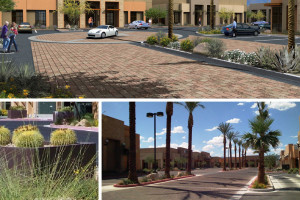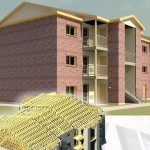 In the pursuit of creating sustainable landscapes, the choice of materials is a pivotal factor that can significantly impact the environmental footprint of a project. Opting for eco-friendly materials not only contributes to the conservation of natural resources but also promotes a healthier and more resilient ecosystem. In this comprehensive guide, we delve into the world of sustainable landscaping, offering insights on selecting eco-friendly materials, with a focus on recycled pavers and low-impact hardscape materials.
In the pursuit of creating sustainable landscapes, the choice of materials is a pivotal factor that can significantly impact the environmental footprint of a project. Opting for eco-friendly materials not only contributes to the conservation of natural resources but also promotes a healthier and more resilient ecosystem. In this comprehensive guide, we delve into the world of sustainable landscaping, offering insights on selecting eco-friendly materials, with a focus on recycled pavers and low-impact hardscape materials.
Understanding the impact of landscape materials
Environmental considerations
Landscaping materials can have a profound impact on the environment. From the extraction of raw materials to the manufacturing process and eventual disposal, each phase of a material’s life cycle contributes to its overall environmental footprint. Sustainable landscaping seeks to minimize this impact by choosing materials that are eco-friendly throughout their life cycle.
Importance of recycled and low-impact materials
Recycled pavers and low-impact hardscape materials are key players in sustainable landscaping. Recycled materials repurpose waste and reduce the demand for new resources, while low-impact materials are designed to minimize environmental harm during production and use. Selecting these materials aligns with the principles of environmental stewardship and conservation.
Choosing recycled pavers for sustainable landscapes
Advantages of recycled pavers
Recycled pavers, often made from reclaimed concrete or post-consumer recycled materials, offer numerous advantages for sustainable landscapes. These include:
- Resource conservation: Using recycled materials reduces the need for new resource extraction, conserving natural aggregates and decreasing the demand for energy-intensive manufacturing processes.
- Waste diversion: Repurposing materials that would otherwise end up in landfills helps divert waste, contributing to a circular economy where materials are reused and recycled.
- Durability: Recycled pavers are known for their durability and strength, making them a sustainable choice that stands the test of time, minimizing the need for frequent replacements.
Design flexibility
Recycled pavers come in various styles, shapes, and colors, offering design flexibility for sustainable landscapes. Whether you prefer a contemporary look or a more rustic aesthetic, recycled pavers can be tailored to meet your design preferences while contributing to environmental conservation.
Certification and verification
When selecting recycled pavers, look for certifications and verifications that attest to their eco-friendly credentials. Certifications from reputable organizations ensure that the materials meet specific sustainability standards and have undergone rigorous assessments for environmental performance.
Exploring low-impact hardscape materials
Permeable pavers
Permeable pavers are a prime example of low-impact hardscape materials that contribute to sustainable landscaping. These pavers allow water to pass through the surface, promoting natural drainage and reducing stormwater runoff. Benefits of permeable pavers include:
- Water conservation: Permeable pavers help recharge groundwater and reduce the strain on stormwater management systems, contributing to water conservation efforts.
- Reduced heat island effect: Unlike traditional impervious surfaces, permeable pavers mitigate the heat island effect by allowing water to evaporate, resulting in cooler surface temperatures.
- Improved soil health: Water infiltration through permeable pavers enhances soil health by replenishing moisture and supporting the natural processes of the underlying ecosystem.
Low-impact concrete alternatives
Innovations in concrete technology have led to the development of low-impact alternatives that prioritize sustainability without compromising structural integrity. These alternatives may include:
- Fly ash concrete: By incorporating fly ash, a byproduct of coal combustion, into concrete mixtures, the environmental impact of traditional concrete is reduced, and the material becomes more sustainable.
- Recycled aggregate concrete: Utilizing recycled aggregates from construction and demolition waste in concrete production decreases the demand for virgin materials and reduces the carbon footprint of the concrete.
Native and drought-tolerant plants
While not hardscape materials, the selection of plants plays a crucial role in sustainable landscaping. Native and drought-tolerant plant species require less water, maintenance, and chemical inputs, contributing to the overall ecological balance of the landscape.
Implementing sustainable landscaping practices
Site assessment
Before embarking on a sustainable landscaping project, conduct a thorough site assessment. Understand the local climate, soil conditions, and water availability. This knowledge informs material choices and landscape design, ensuring that the project aligns with the natural environment.
Design with longevity in mind
Sustainable landscapes are built to last. Opt for designs that consider the longevity of materials and minimize the need for replacements. Durable and resilient materials, such as recycled pavers, contribute to the sustainability of the landscape over time.
Stormwater management
Integrate stormwater management strategies into the landscape design. Permeable pavers, rain gardens, and bio-swales are effective solutions that help mitigate stormwater runoff and promote water infiltration.
Professional guidance
For a seamless transition to sustainable landscaping, consider seeking professional guidance from experts like McNeil Engineering. Their team of experienced engineers and landscape architects can provide valuable insights, from material selection to project implementation.
McNeil Engineering
Embark on your journey towards sustainable landscaping with the expertise of McNeil Engineering. As leaders in civil engineering and landscape architecture, McNeil Engineering is dedicated to creating environmentally conscious and resilient landscapes.
Visit their website to explore a comprehensive range of services, including landscape design, engineering, and project management. McNeil Engineering’s commitment to sustainability ensures that your landscaping project not only meets high standards of design but also aligns with principles of environmental stewardship.
Contact McNeil Engineering today and collaborate with their team of professionals to transform your vision of a sustainable landscape into a reality. Together, let’s build a future where landscapes not only captivate the eye but also nurture the environment for generations to come.







